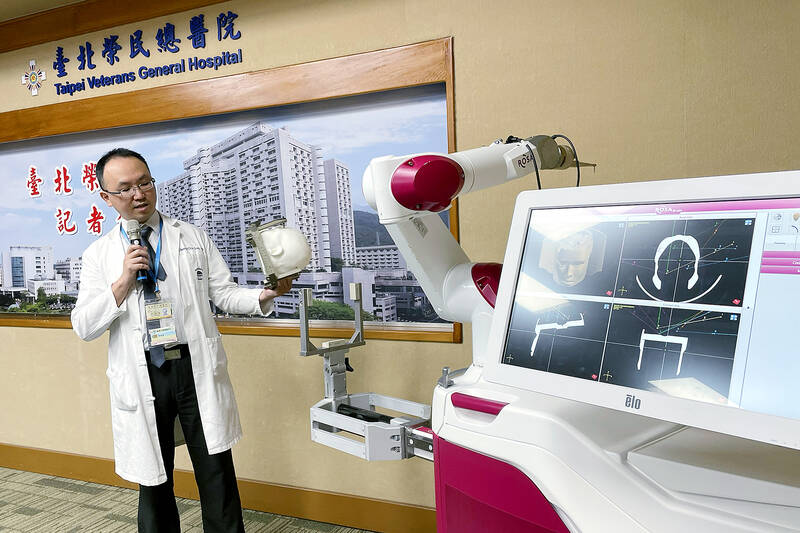A surgical robotic arm has been helping doctors at Taipei Veterans General Hospital perform brain surgeries to treat drug-resistant epilepsy.
Taiwan has about 200,000 to 300,000 people with epilepsy, of which 60,000 to 70,000 can only be treated by surgery that removes the condition’s physiological cause — called epileptic focus — from the patient’s brain, Lee Cheng-chia (李政家), a neurosurgeon at the hospital, said on Thursday last week.
Open brain surgery poses a high risk to patients, particularly those with an epileptic focus located deep inside the brain or spread over a wide part of the organ, making it more difficult for surgeons to bypass blood vessels or regions of the brain that govern vital functions, he said.

Photo: Chiu Chih-jou, Taipei Times
The hospital’s robot-assisted surgery system features 3D imaging and a real-time surgical instrument tracking capability, which enables epileptic surgeries to be performed without opening up the skull, he said.
Since receiving the machine in March 2021, the hospital has performed more than 100 successful procedures, Lee said.
Many patients would never have been treated surgically if the robotic arm was not there to mitigate risks associated with the procedure, he added.
Aided by the robotic arm, surgeons can perform a wide variety of procedures, including electrode implantation, deep brain stimulation and biopsy at twice the speed of unassisted surgery, while experiencing less fatigue and reducing chances of making a mistake, he said.
People with drug-resistant epilepsy are usually unable to live a normal life or work, Lee said.
Surgery can cure about 70 percent of patients with drug-resistant epilepsy and reduce the frequency of attacks in 20 percent of patients, he said.
The beneficiaries of the hospital’s robotic system include a 37-year-old man who had suffered from the condition since he was 10, said Yu Hsiang-yu (尤香玉), who heads the hospital’s epilepsy department.
The man faced a bleak prognosis because the epileptic focus was close to the visual cortex, meaning it could not be removed without a significant risk of blindness, she said, adding that the mood of the patient’s medical team was grim.
The surgery was made possible with the hospital’s acquisition of the robotic system, which allowed doctors to precisely target the focus with an electric pulse in lieu of open brain surgery, Yu said.

An essay competition jointly organized by a local writing society and a publisher affiliated with the Chinese Communist Party (CCP) might have contravened the Act Governing Relations Between the People of the Taiwan Area and the Mainland Area (臺灣地區與大陸地區人民關係條例), the Mainland Affairs Council (MAC) said on Thursday. “In this case, the partner organization is clearly an agency under the CCP’s Fujian Provincial Committee,” MAC Deputy Minister and spokesperson Liang Wen-chieh (梁文傑) said at a news briefing in Taipei. “It also involves bringing Taiwanese students to China with all-expenses-paid arrangements to attend award ceremonies and camps,” Liang said. Those two “characteristics” are typically sufficient

A magnitude 5.9 earthquake that struck about 33km off the coast of Hualien City was the "main shock" in a series of quakes in the area, with aftershocks expected over the next three days, the Central Weather Administration (CWA) said yesterday. Prior to the magnitude 5.9 quake shaking most of Taiwan at 6:53pm yesterday, six other earthquakes stronger than a magnitude of 4, starting with a magnitude 5.5 quake at 6:09pm, occurred in the area. CWA Seismological Center Director Wu Chien-fu (吳健富) confirmed that the quakes were all part of the same series and that the magnitude 5.5 temblor was

The brilliant blue waters, thick foliage and bucolic atmosphere on this seemingly idyllic archipelago deep in the Pacific Ocean belie the key role it now plays in a titanic geopolitical struggle. Palau is again on the front line as China, and the US and its allies prepare their forces in an intensifying contest for control over the Asia-Pacific region. The democratic nation of just 17,000 people hosts US-controlled airstrips and soon-to-be-completed radar installations that the US military describes as “critical” to monitoring vast swathes of water and airspace. It is also a key piece of the second island chain, a string of

The Central Weather Administration has issued a heat alert for southeastern Taiwan, warning of temperatures as high as 36°C today, while alerting some coastal areas of strong winds later in the day. Kaohsiung’s Neimen District (內門) and Pingtung County’s Neipu Township (內埔) are under an orange heat alert, which warns of temperatures as high as 36°C for three consecutive days, the CWA said, citing southwest winds. The heat would also extend to Tainan’s Nansi (楠西) and Yujing (玉井) districts, as well as Pingtung’s Gaoshu (高樹), Yanpu (鹽埔) and Majia (瑪家) townships, it said, forecasting highs of up to 36°C in those areas